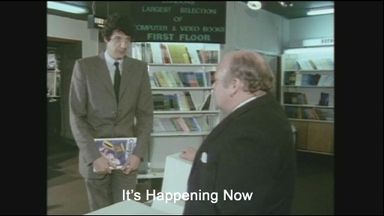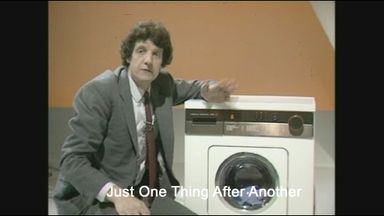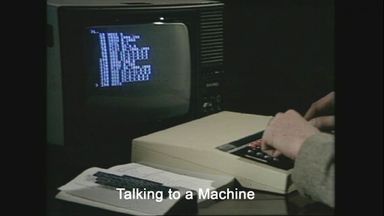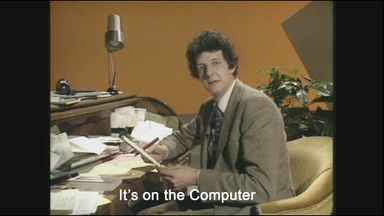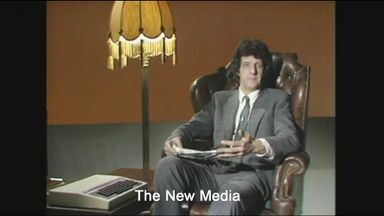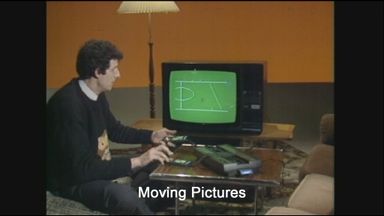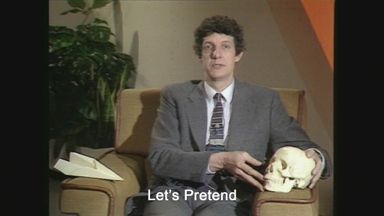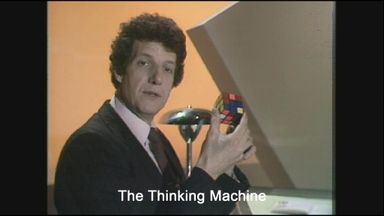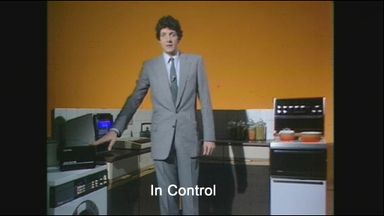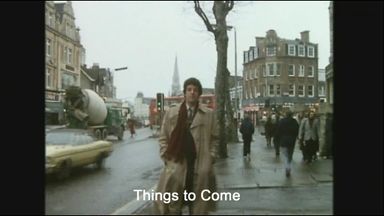The Computer Programme
8. The Thinking Machine
Clips from this programme
Programming a computer to solve the rubix cube puzzle isn't easy because first you need to know how to solve it yourself. What we want is a machine which can solve problems for itself - artificial intelligence - the Thinking Machine.
Duration: 00:40Mac is in the Hampton Court Maze with K9 the fictional robot dog from Dr Who (1977). Finding the way out may involve cheating, trial and error or painstakingly mapping the maze.
Duration: 03:17A microcomputer playing noughts and crosses learns what it means to win by experience even by playing itself
Duration: 01:50Roger Shank, University of Yale searches for 'thinking' machines that can equal or beat humans, but many human skills we take for granted are very difficult to mimic
Duration: 01:08Mac explains how difficult it is for a computer even with vision to analyse and interpret a scene - for example to recognise that someone is sitting on a chair.
Duration: 01:29Teaching a machine to analyse context in language even within limited domains is very difficult - as explained by Roger Shank of Yale.
Duration: 03:17Expert systems - for example for diagnosing faults in machines - are rule based and enable a diagnostic probabilities by asking a series of questions and dealing even with uncertain answers. In this case a car which fails to start.
Duration: 04:27At Leeds' St James Hospital a patient's history and symptoms are entered into an expert system on a computer to provide weighted statistical diagnoses of what's wrong. Although 'clinical impression' is a powerful clinician's skill a doctor's conclusions can be helped by the computer's diagnosis. Expert systems are a valuable tool but still primitive.
Duration: 05:11The noughts and crosses machine has learned how to win since the TV programme started.
Duration: 00:51End titles over film of two robots playing chess.
Duration: 01:36The Computer Programme
1. It's Happening Now
First broadcast: 11th January 1982
Duration 24:51
"Don't expect the computer revolution to happen tomorrow, it's going on all around us." Chris Serle, Ian McNaught-Davis and Gill Nevill begin their exploration of the world of Information Science and ask: 'What can computers do for us? Who is using them now, and where is this technology likely to lead?' Director: FRANK ASH Director: MATT BONEY Producer: PAUL KRIWACZEK
2. Just One Thing After Another
First broadcast: 18th January 1982
Duration 24:53
CHRIS SERLE, IAN MCNAUGHT-DAVIS and Gill Nevill, continue their exploration of the world of information science. Even the most elaborate and sophisticated computer programs are made up of only a few types of relatively simple steps. The art of computer programming lies in combining these into ever more complex combinations. Directors FRANK ASH, MATT BONEY Producer PAUL KRIWACZEK
3. Talking to a Machine
First broadcast: 25th January 1982
Duration 24:23
CHRIS SERLE, IAN MCNAUGHT-DAVIS and GILL NEVILL continue their exploration of the world of information science. The difficulty of communicating with computers is that they are machines and we are people. The common language we share can turn out to be a lot more like English than we might expect. Directors FRANK ASH, MATT BONEY Producer PAUL KRIWACZEK
4. It's on the Computer
First broadcast: 1st February 1982
Duration 24:39
CHRIS SERLE, IAN MCNAUGHT-DAVIS and GILL NEVILL continue their exploration of the world of information science. Storing information is what the great majority of computers are used for. But how much can they hold, and how can the stored information be easily retrieved? Director MATT BONEY Producer PAUL KRIWACZEK
5. The New Media
First broadcast: 8th February 1982
Duration 24:12
CHRIS SERLE, IAN MCNAUGHT-DAVIS and GILL NEVILL continue their exploration of the world of Information Science. 5: The New Media : The greatest public impact of information technology is likely to be in the provision of new means of communication. Directors FRANK ASH, MATT BONET Producer PAUL KRIWACZEK
6. Moving Pictures
First broadcast: 15th February 1982
Duration 24:37
CHRIS SERLE, IAN MCNAUGHT-DAVIS and GILL NEVILL continue their exploration of the world of information science. For many people games, with their elaborate visual displays, are the most commonly encountered aspect of computer technology. But generating sound and pictures from a computer is no different to manipulating text. Director: MATT BONEY Director: Frank Ash Producer: PAUL KRIWACZEK
7. Let's Pretend
First broadcast: 22nd February 1982
Duration 24:32
CHRIS SERLE, IAN MCNAUGHT-DAVIS and GILL NEVILL continue their exploration of the world of information science. 7: Let's Pretend: Training space-shuttle pilots, or testing bridges to destruction, is normally too costly or too dangerous to do on the real thing. But by giving a computer an exact description of how a complicated system behaves, it can mimic anything from the British economy to the world's weather. Directors FRANK ASH, MATT BONEY Producer PAUL KRIWACZEK
8. The Thinking Machine
First broadcast: 1st March 1982
Duration 24:30
CHRIS SERLE, IAN MCNAUGHT-DAVIS and GILL NEVILL continue their exploration of the world of information science 8: The Thinking Machine: In spite of years of investment in the development of intelligent machines, computer scientists are still a long way from equalling human thought, let alone surpassing it. The future, however, may yet present us with great surprises. Directors MATT BONEY, FRANK ASH Producer PAUL KRIWACZEK
Now playing
9. In Control
First broadcast: 8th March 1982
Duration 24:34
CHRIS SERLE, IAN MCNAUGHT-DAVIS, GILL NEVILL 9: In Control: By far the greatest number of computers with which we will come into contact in the future will be invisible. They will be the microprocessors built into many of our domestic appliances, replacing many of the mechanical systems that we use today, with greatly improved reliability, flexibility, and at low cost. Directors FRANK ASH, MATT BONEY Producer PAUL KRIWACZEK
10. Things to Come
First broadcast: 15th March 1982
Duration 24:17
CHRIS SERLE, IAN MCNAUGHT-DAVIS and GILL NEVILL continue their exploration of the world of information science. Things to Come: Information technology has the power to change the face of our society completely by taking over the work of a large majority of the population. But will this be allowed to happen, and which aspects of our economic life are most likely to be affected? Directors MATT BONEY, FRANK ASH Producer PAUL KRIWACZEK











